The Wolves of Midwinter twgc-2 Read online
Page 29
Reuben received one brief e-mail written by Susie Blakely saying “I loved the party and will remember it all my life.” He imagined it had been a chore for her to write that much and spell it correctly. He wrote her back to say that he hoped she had the very best Christmas ever and he was here for her anytime that she wanted to write or call. Pastor George sent him a longer e-mail, explaining that Susie was now doing much better, and was willing to confide in her parents again though they still did not believe Susie had been rescued by the famous Man Wolf. Pastor George was driving to San Francisco to have lunch with Father Jim and see his church in the Tenderloin.
Night after night, Reuben woke in the small hours. Night after night, he took a long slow walk around the upstairs hallways and the lower floor, quietly opening himself to a visit from Marchent. But never was there the slightest inkling of her presence.
Sunday afternoon, when the rain let up, Phil and Reuben took a long walk in the forest together. Reuben confessed he’d never covered the entire property. Felix had explained at lunch that he was having the entirety of it fenced, including the Drexel and Hamilton acreages. This was an immense undertaking, but Felix felt in this day and age it was something he wanted to do and of course Reuben was in agreement.
Felix promised that after Christmas, he would take Reuben and Phil to see the old Drexel and Hamilton houses, both big old Victorian country homes that could be remodeled and updated without losing their charm.
The fencing was chain link, and six feet in height. But there would be numerous gates; and Felix would make certain that ivy and other attractive vines covered every ugly inch of it. Of course people could still hike the woods, yes, definitely. But they would enter by the front gate, and Reuben and Felix would have some idea of who was out there. And, well, there would be times when he opened all the gates and people could roam freely. It was wrong to “own” this woods, but he wanted to preserve it and he wanted to get to know it again.
“Well, that won’t keep Elthram and his family out of the woods, will it?” Phil asked.
Felix was startled but quickly recovered. “Oh, no, they’re always welcome in the woods whenever and wherever. I would never dream of trying to keep them out of the woods. These woods are their woods.”
“That’s good to know,” said Phil.
That night, Reuben came upstairs to find a long dark green velvet robe on his bed, and a pair of heavy green velvet slippers. The robe had a hood and was full length.
Margon explained that this was for Christmas Eve, for him to wear into the forest. The robe was very similar to a monk’s habit, long, loose fitting, with large sleeves, except that it was padded and lined in silk, and had no waist or belt, and closed down the front with loops and gold buttons. There was tiny fine gold embroidery along the hem and the edges of the sleeves in what seemed a curious pattern. It might have been writing, like the mysterious writing that the Distinguished Gentlemen shared, the writing that looked Eastern in origin. It conveyed an air of mystery and even sanctity.
The usefulness of this garment was obvious. The group would become wolves in the woods, and they would drop these robes easily at their feet and it would be a simple manner to put on these robes afterwards. Reuben was so eager for Christmas Eve that he could scarcely contain it. Stuart was already being a little cynical. Just what sort of “ceremony” were they going to have, he wanted to know. But Reuben knew this was going to be marvelous. Frankly he didn’t care what they did. He wasn’t worried about Hockan Crost or the mysterious women. Felix and Margon appeared completely calm and quietly eager for the all-important night.
And Reuben would see Laura. At last, Reuben would be with Laura. Christmas Eve had taken on the character and solemnity of their wedding night for him.
Felix had already explained to Phil about their celebrating some Old World customs in the forest, and asked for Phil’s indulgence. Phil had been more than fine with it. He’d spend Christmas Eve as he always did, listening to music, and reading, and probably be asleep well before eleven o’clock. The last thing Phil wanted was to be a nuisance. Phil was sleeping wonderfully out here with the windows open to the ocean air. He’d been falling asleep as early as 9:00 p.m.
At last it was Christmas Eve morning, a cold crisp day with a bright white sky that just might show some sunshine before twilight. The foaming sea was dark blue for the first time in days. And Reuben walked down the windy slope to the guesthouse with his box of gifts for his father.
At home in San Francisco, they’d always exchanged gifts before going to Midnight Mass, so Christmas Eve was the big day in Reuben’s mind. Christmas Day had always been informal and a time for leisure, with Phil going off to watch films of Dickens’s Christmas Carol in his room, and Grace having an informal buffet for her hospital friends, especially the personnel who were far from home and family.
Phil was up and writing, and immediately poured a mug of Italian roast coffee for Reuben. The little guesthouse was the epitome of the word “cozy.” Sheer white ruffled curtains had been put over the windows, a remarkably feminine touch, Reuben thought, but they were pretty, and they softened the stark vision of the endless sea, which was something unsettling to Reuben.
They sat by the fire together, Phil presenting Reuben with one small book wrapped in foil, which Reuben opened first. Phil had made it himself, illustrating it with his own freehand drawings, “in the style of William Blake,” he said with a self-mocking laugh. And Reuben saw that it was a collection of the poems Phil had written over the years expressly for his sons, some of which had been published before, and most of which had never been read by anybody.
For My Sons was the simple title.
Reuben was deeply touched. Phil’s spidery drawings surrounded each page, weaving images together rather like the illuminations in medieval manuscripts, and often amounted to frames of foliage with simple domestic objects embedded in them. Here and there in the dense, squiggly drawings was a coffee mug or a bicycle, or a little typewriter or a basketball. Sometimes there were impish faces, crude but kindly caricatures of Jim and Reuben and Grace and Phil himself. There was one primitive whole-page drawing of the Russian Hill house and all its many crowded little rooms filled with cherished furniture and objects.
Never had Phil put together anything like this before. Reuben loved it.
“Now your brother has his own copy coming to him by FedEx today. And I sent your mother one too,” said Phil. “You mustn’t read a word of it now. You take that up to the castle, and you read it when you want to read it. Poetry should be taken in small doses. Nobody needs poetry. Nobody needs to make himself read it.”
There were two other gifts, and Phil assured Reuben that Jim was receiving identical ones. The first was a book Phil had written called simply Our Ancestors in San Francisco—Dedicated to My Sons. Reuben couldn’t have been happier. For the first time in his life, he really wanted to know all about Phil’s family. He’d grown up under the gargantuan shadow of his Spangler grandfather, the real estate entrepreneur who had founded the Spangler fortune, but had heard little or nothing of the Goldings, and this was not typed, this book, it was written in Phil’s old-fashioned and beautifully readable cursive. There were old photographs reproduced here that Reuben had never seen before.
“You take your time with that, too,” said Phil. “You take the rest of your life, if you like, to read it. And you pass it on to your boy, of course, though I intend to tell that child some of the stories I never told you and your brother.”
The last gift was a soft tweed flat cap, or ivy cap, which had belonged to Grandfather O’Connell—just like the cap Phil had been wearing on his walks. “Your brother got the very same thing,” said Phil. “My grandfather never went out without one of these caps. And I have another couple in my trunk for that boy who’s coming.”
“Well, Dad, these are the best presents anyone’s ever given me,” said Reuben. “This is an extraordinary Christmas. It just keeps getting better and better.” He conce
aled the low burning pain he felt—that he’d had to lose his life to really understand the value of it, that he’d had to leave the realm of human family to want to know and embrace his antecedents.
Phil looked at him gravely. “You know, Reuben,” he said. “Your brother Jim is lost. He’d buried himself alive in the Catholic priesthood for all the wrong reasons. The world in which he struggles is shrunken and dark. There’s no magic in it, no wonder, no mysticism. But you have the universe waiting for you.”
If only I could tell you the smallest part of it, if only I could confide and seek your guidance. If only …
“Here, Dad, my presents,” Reuben said. And he brought in the big box of carefully wrapped little volumes and set it before Phil.
Phil was in tears when he opened the first one, seeing the little Ginn and Company hardcover of Hamlet, the very textbook version he’d cherished as an undergraduate. And as he came to see that the complete plays were here, every single one of them, he was overwhelmed. This was something he hadn’t even dreamed of—the entire collection. These books had been out of print even when he first came upon them in secondhand shops in his student days.
He choked back the tears, talking softly of his time at Berkeley as the richest period of his life, when he was reading Shakespeare, acting Shakespeare, living Shakespeare every day, spending hours under the trees of the beautiful old campus, wandering the Telegraph Avenue bookstores for scholarly works on the Bard, thrilled every time some piercing critic gave him a new insight, or brought the plays to life for him in some new way. He’d thought then he would love the academic world always. He wanted nothing more than to stay in the atmosphere of books and poetry forever.
Then had come teaching, and repeating the same words year after year, and the endless committee meetings, and tiresome faculty parties, and the relentless pressure to publish critical theories or ideas that he didn’t even have in him. Then had come weariness of it all, and hatred even, and his conviction of his own utter insignificance and mediocrity. But these little volumes took him back to the sweetest part of it—when it had been new, and filled with hope, before it had become a racket for him.
About that time, Lisa appeared with a full breakfast for both of them—scrambled eggs, sausage and bacon, pancakes, syrup, butter, toast, and jam. She had it set up quickly at the little dining table, and put on fresh coffee. Jean Pierre appeared with the carafe of orange juice, and a plate of the gingerbread cookies which Phil couldn’t resist.
After they’d demolished the meal, Phil stood for a long time at the large rectangular window looking out at the sea, at the dark blue horizon lying beneath the brighter cobalt of the clear sky. Then he said how he had never dreamed he could be this happy, never dreamed he had this much life left in him.
“Why don’t people do what they really want to do, Reuben?” he asked. “Why do we so often settle for what makes us devoutly unhappy! Why do we accept that happiness just isn’t possible? Look what’s happened. I’m ten years younger now than I was a week ago, and your mother? Your mother’s perfectly fine with it. Perfectly fine. I was always too old for your mother, Reuben. Too old in here, in my heart, and just plain too old in every other way. When I get the slightest doubt about her being happier, I call and I talk to her and I listen to the timbre of her voice, you know, the cadence of her speech. She’s so relieved to be on her own.”
“I hear you, Dad,” Reuben said. “I feel a little the same way when I think of my years with Celeste. I don’t know why I woke up every morning with the idea that I had to adjust, had to accept, had to go along with.”
“That’s it, isn’t it?” Phil said, turning from the window. He shrugged and made a resigned gesture with his hands. “Thank you, Reuben, for letting me come here.”
“Dad, I don’t ever want you to leave,” said Reuben.
The expression in Phil’s eyes was the only response he needed. Phil went over to the box of Shakespeare books and took out the copy of A Midsummer Night’s Dream. “You know, I can’t wait to read parts of this to Elthram and Mara. Mara said she’s never heard of A Midsummer Night’s Dream. Elthram knew it. He can recite parts of it by heart. You know, Reuben? I’m going to give my old copy of the comedies to Elthram and Mara. It’s here somewhere. Well, I have two. I’ll give them the one without the notes, the clean one. I think that would be a good present for Elthram and Mara. And look what they gave to me.” He turned and pointed to a small bouquet of brightly colored wildflowers on his desk, with streams of ivy trailing from it. “I didn’t know there were that many wildflowers in the woods this time of year. They gave me that early this morning.”
“It’s beautiful, Dad,” said Reuben.
That afternoon, they drove to the coast and to the town of Mendocino, to have a walk around while the weather held. And it was worth it. The little downtown of beach Victorian buildings was as cheerfully decorated as the village of Nideck, and bustled with last-minute Christmas shoppers. The sea was calm as well as beautifully blue, and the sky overhead, filled with scudding white clouds, was glorious.
But by four o’clock, as they drove home, the slate-colored sky was rolling over them, and the evening gloom was falling around them. Tiny raindrops struck the windshield. Reuben thought to himself how little it would matter when he was in full wolf coat whether a storm descended on Nideck Point, and he settled into his own quiet growing anticipation. Would they hunt tonight? They had to hunt. He was starving for the hunt and he knew that Stuart was starving for it too.
He stayed long enough in Phil’s little house to call Grace and Jim and wish them both the happiest of Christmases. Jim would say Midnight Mass tonight at St. Francis at Gubbio Church as always, and Grace, Celeste, and Mort would be there. Tomorrow they’d all serve Christmas dinner at the St. Francis dining room for the homeless and the poor of the Tenderloin.
Finally, it was time to take leave of Phil. It was Christmas Eve at last. It was full dark, and the rain had become a fine mist outside the windows. The forest beckoned.
As he came up the slope, Reuben realized all the outside lights of Nideck Point had been turned off. The cheerful three-story house so well drawn on the night with bright Christmas lights had vanished, leaving in its place a great dark apparition of glinting windows with only the faintest light within, gables invisible in the shrouding mist.
Only a few candles lighted his way up the stairs. And in his room, he found the green velvet hooded robe laid out for him, with the slippers.
Another spectacular item had been added—a very large drinking horn trimmed in gold and beautifully carved with tiny gold-filled figures and symbols. There was a band of hammered and decorated gold beneath the lip, and a gold tip on the end, and a long thin leather shoulder strap for carrying it. It was a beautiful thing, too big for a buffalo or sheep horn, obviously.
A knock on his door interrupted him as he inspected it. He heard Felix’s faintly muffled voice say: “It’s time.”
21
ONLY ONE CANDLE LIGHTED his way down the staircase, and he felt the emptiness and the vastness of the house.
From far off came the ominous beat of drums.
When he stepped out onto the back steps, he could barely see the five hooded figures in the heavy darkness. The distant drums sounded a bizarre and faintly menacing cadence. And just below the sound of the wind, he heard the faint melody of flutes. The rain was no more than a thick mist now that he could feel but not hear, though a wind gusted through the distant trees and he heard that awful moaning that can come with the wind.
An instinctive fear gripped him. Far off, he saw the lurid flickering of a fire. It was a huge fire, a fire so huge it struck a deep chord of alarm in him. But the rain-drenched forest was in no danger from the fire. He knew that.
Gradually he made out more clearly the outlines of those nearest him. There was the loud crack of a kitchen match and a little blaze flared revealing Margon with a long slender torch in his hand.
At once, the torch was ig
nited and the other figures emerged in the burgeoning light.
Reuben could smell the pitch or the tar of the torch, he didn’t know for sure which it was.
They began to walk through the forest with Margon, torch in hand, leading the way. It seemed the distant drums knew they were coming. There came the deep insistent throbbing of big drums, and the relentless goading sound of other smaller drums, and then the horns soaring above them. Another instrumental voice joined in that might have been the Irish pipe, high, nasal, and almost baleful.
All around them the forest rustled, snapped, and moved in the shadows. As they struggled over rocks and fallen bracken moving steadily onwards, he heard hushed and secretive laughter. He could see the dim white faces of the Forest Gentry, mere flashes on either side of the irregular path they followed, and suddenly the faintest eeriest music rose to accompany them—in time with the greater sound summoning them from afar—the roughened mournful notes of wooden pipes, the tap and jingle of tambourines, a restless humming.
He felt the chills come up on the back of his arms and his neck, but they were pleasurable chills. His nakedness beneath the robe felt erotic.
On and on they walked. Reuben began to feel the deep pringling that meant the change. But Felix’s hand gripped his wrist. “Wait,” he said gently, falling into stride beside Reuben, steadying him when he stumbled or almost fell.
The drums in the distance grew louder. The deepest drums slowed to the ominous and terrifying sound of a knell, and the deep whine of the Irish pipes was hypnotic. Overhead the high remote branches of the redwoods groaned and creaked with the Forest Gentry. Sharp sounds came from the underbrush as of vines ripped in the blackness, and of branches beating the underbrush.
The fire was a great red glare in the mist ahead, flashing in a vast mesh of tangled vine and branches.
This way and that they turned as they walked. He had no idea now in which direction he was going except that they were drawing closer and closer, always, to that glare.

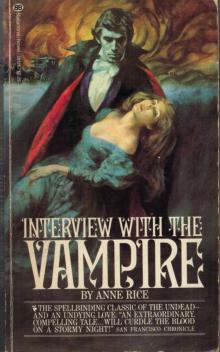 Interview with the Vampire
Interview with the Vampire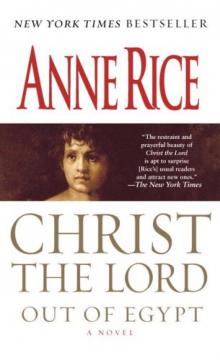 Christ the Lord: Out of Egypt
Christ the Lord: Out of Egypt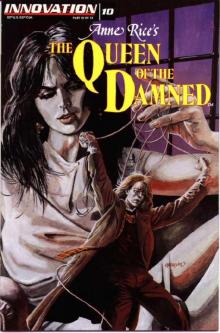 The Queen Of The Damned
The Queen Of The Damned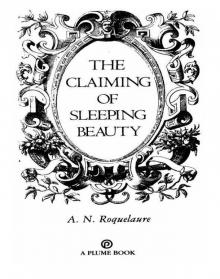 The Claiming of Sleeping Beauty
The Claiming of Sleeping Beauty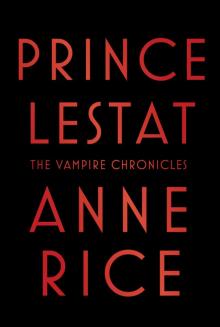 Prince Lestat
Prince Lestat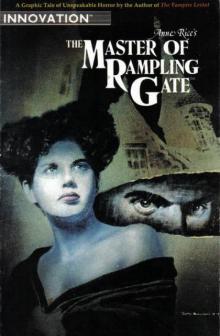 The Master of Rampling Gate
The Master of Rampling Gate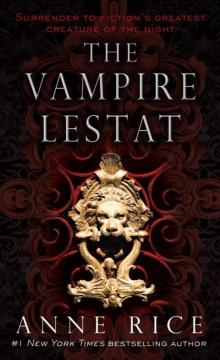 The Vampire Lestat
The Vampire Lestat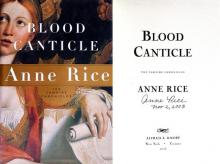 Blood Canticle
Blood Canticle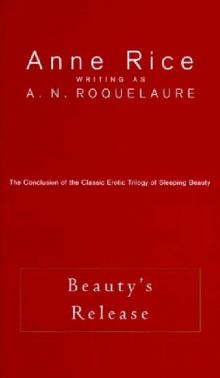 Beauty's Release
Beauty's Release Pandora
Pandora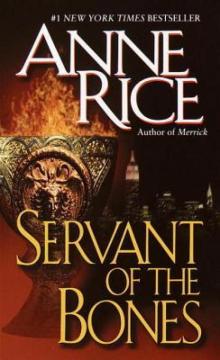 Servant of the Bones
Servant of the Bones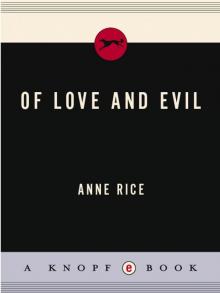 Of Love and Evil
Of Love and Evil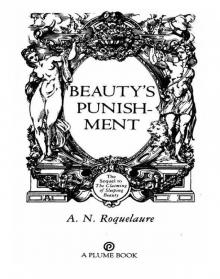 Beauty's Punishment
Beauty's Punishment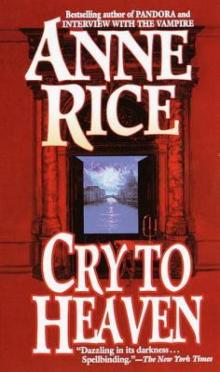 Cry to Heaven
Cry to Heaven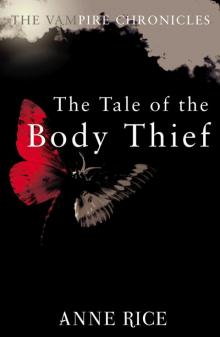 The Tale of the Body Thief
The Tale of the Body Thief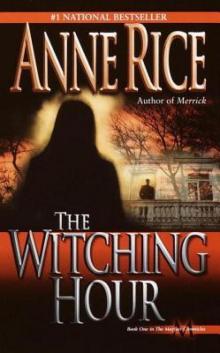 The Witching Hour
The Witching Hour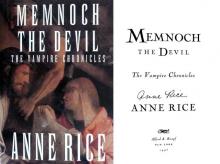 Memnoch the Devil
Memnoch the Devil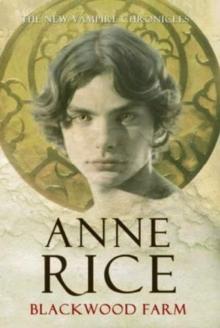 Blackwood Farm
Blackwood Farm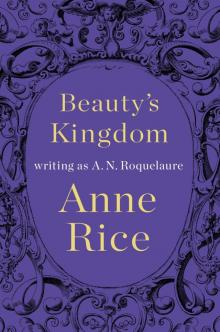 Beauty's Kingdom
Beauty's Kingdom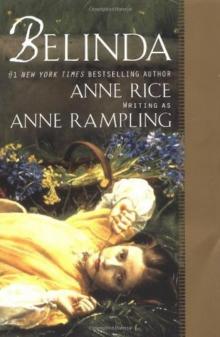 Belinda
Belinda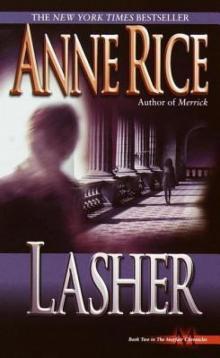 Lasher
Lasher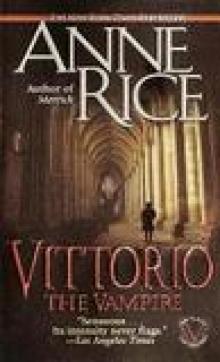 Vittorio, the Vampire
Vittorio, the Vampire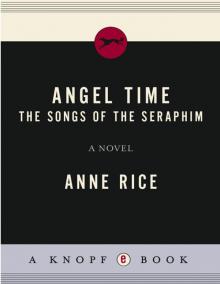 Angel Time
Angel Time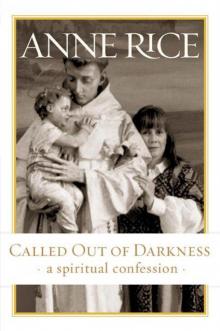 Called Out of Darkness: A Spiritual Confession
Called Out of Darkness: A Spiritual Confession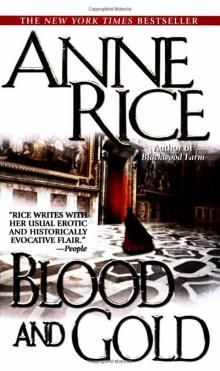 Blood And Gold
Blood And Gold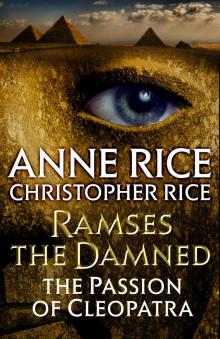 The Passion of Cleopatra
The Passion of Cleopatra Taltos
Taltos Exit to Eden
Exit to Eden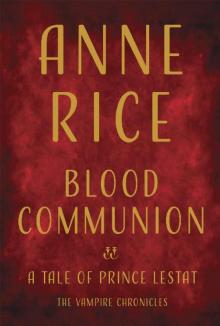 Blood Communion (The Vampire Chronicles #13)
Blood Communion (The Vampire Chronicles #13)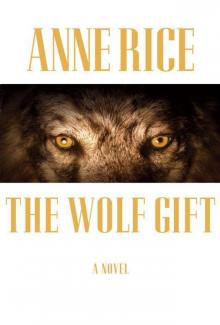 The Wolf Gift
The Wolf Gift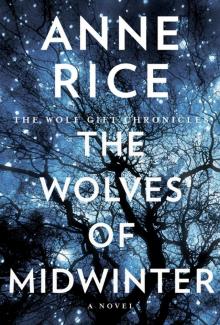 The Wolves of Midwinter
The Wolves of Midwinter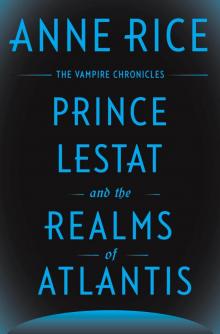 Prince Lestat and the Realms of Atlantis
Prince Lestat and the Realms of Atlantis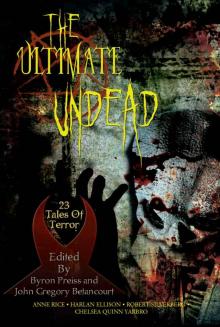 The Ultimate Undead
The Ultimate Undead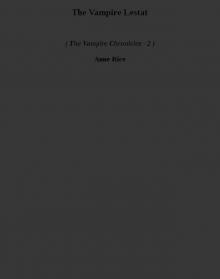 The Vampire Lestat tvc-2
The Vampire Lestat tvc-2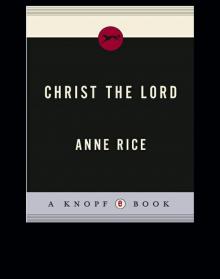 The Road to Cana
The Road to Cana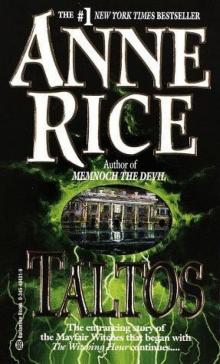 Taltos lotmw-3
Taltos lotmw-3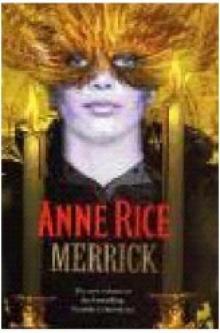 Merrick tvc-7
Merrick tvc-7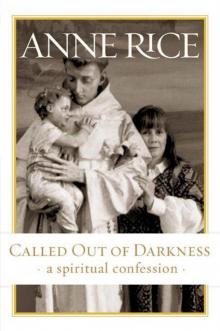 Called Out of Darkness
Called Out of Darkness Pandora - New Vampires 01
Pandora - New Vampires 01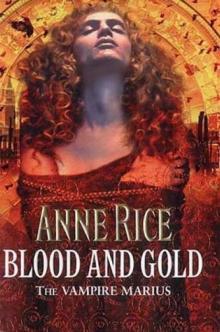 Bllod and Gold
Bllod and Gold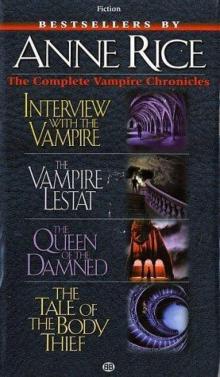 The Queen Of the Damned: Vampire Chronicles
The Queen Of the Damned: Vampire Chronicles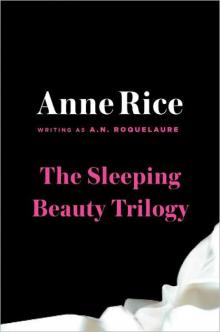 The Sleeping Beauty Trilogy
The Sleeping Beauty Trilogy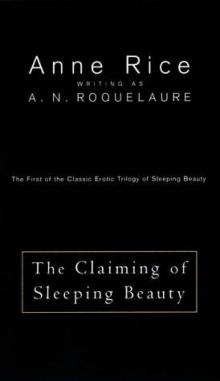 The Claiming of Sleeping Beauty b-1
The Claiming of Sleeping Beauty b-1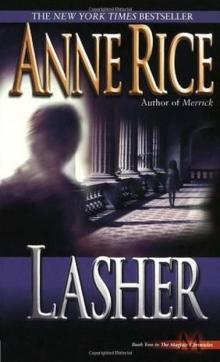 Lasher lotmw-2
Lasher lotmw-2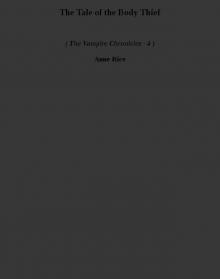 The Tale of the Body Thief tvc-4
The Tale of the Body Thief tvc-4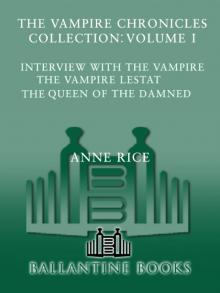 The Vampire Chronicles Collection
The Vampire Chronicles Collection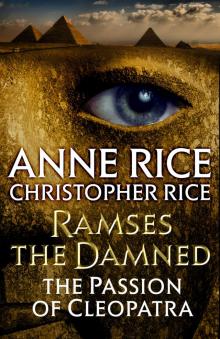 Ramses the Damned
Ramses the Damned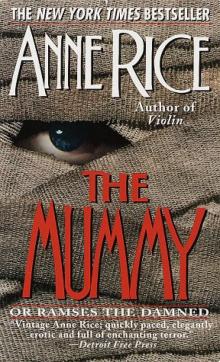 The Mummy - or Ramses the Damned
The Mummy - or Ramses the Damned Vittorio, The Vampire - New Vampires 02
Vittorio, The Vampire - New Vampires 02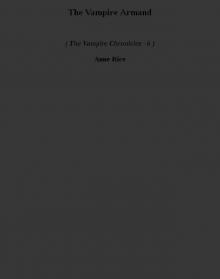 The Vampire Armand tvc-6
The Vampire Armand tvc-6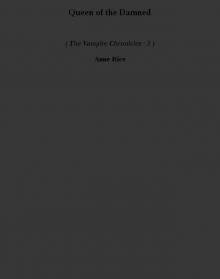 Queen of the Damned tvc-3
Queen of the Damned tvc-3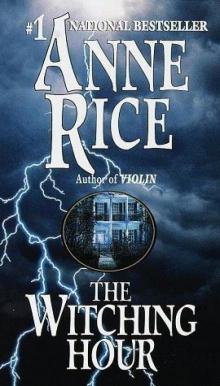 The witching hour lotmw-1
The witching hour lotmw-1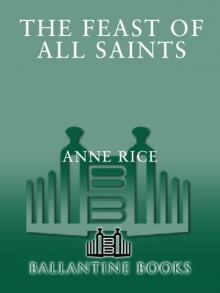 Feast of All Saints
Feast of All Saints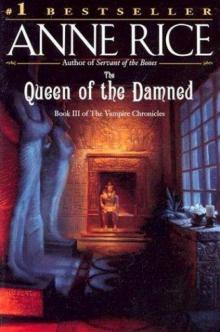 Queen of the Damned
Queen of the Damned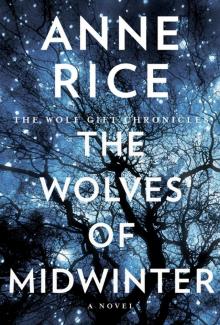 The Wolves of Midwinter twgc-2
The Wolves of Midwinter twgc-2 The Mummy
The Mummy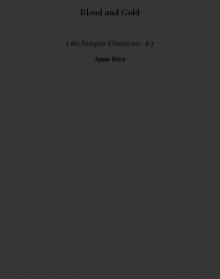 Blood and Gold tvc-8
Blood and Gold tvc-8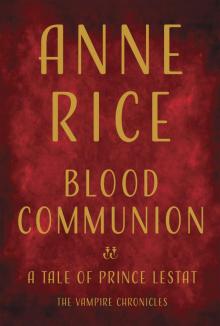 Blood Communion
Blood Communion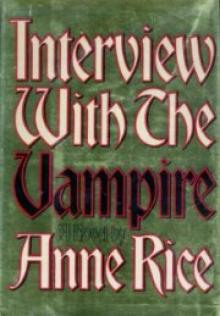 Interview with the Vampire tvc-1
Interview with the Vampire tvc-1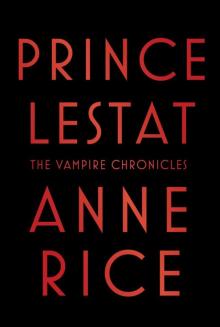 Prince Lestat: The Vampire Chronicles
Prince Lestat: The Vampire Chronicles